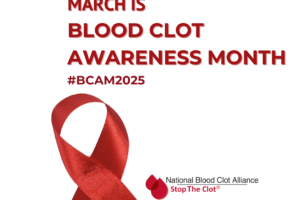Anticoagulant Treatment Barriers Impact DVT/PE Prophylaxis Decisions Among THA/TKA Surgeons
DVT/PE Awareness Among At-Risk THA/TKA Patients is Low
Therapeutic barriers perceived by total hip arthroplasty (THA) and total knee arthroplasty (TKA) surgeons impact their use of anticoagulation therapies in the prevention of deep vein thrombosis (DVT) and pulmonary embolism (PE) among THA/TKA patients, and, despite evidence-based guidelines, DVT/PE prophylaxis practices vary widely, according to survey results.
Data from NBCA’s online survey of 200 U.S. surgeons who perform total hip arthroplasty (THA) and/or total knee arthroplasty (TKA), show that, on average, 38% of surgeons surveyed actually refrain from prescribing warfarin, and 29% refrain from prescribing low molecular weight heparin (LMWH), due to perceived barriers associated with these therapies. In addition, these data also show that, on average, treatment barriers cause 18% of surgeons surveyed to shorten warfarin treatment time, and 16% to shorten LMWH treatment time. The primary treatment barriers cited by surgeons included, for warfarin, INR monitoring, bleeding, and drug interactions, and, for LMWH, bleeding and patient difficulty with injections.
Prophylaxis Practices
DVT/PE Risk Versus THA/TKA Patient Awareness
Quick Facts
NBCA Survey Methodology
The NBCA DVT/PE Awareness Survey was made possible by a grant from Ortho-McNeil™, a Division of Ortho-McNeil-Janssen Pharmaceuticals, Inc.



